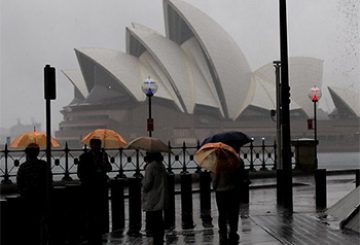As they said of Rick’s in Casablanca, everybody comes to the Obsidian. And, as at Rick’s, they run the gamut: German climatologists, Italian game fishermen, Australian teachers who work on the Falklands, Belgian authors, Scottish contract painters, Canadian filmmakers and British tourists.
Actually, these latter are a bit of an anomaly: Ascension Island, in the middle of the Atlantic Ocean, isn’t exactly your run-of-the-mill tourist destination. With only two ways of reaching the place—a flight from RAF Brize Norton or a three-day passage on the RMS St Helena from the island that gives that ship its name— getting there is half the battle. With the presence of the RAF and US Air Force on the island, visitors can expect to complete a lot of paperwork before arriving as well.
It was on the patio of the Obsidian that we met the child psychologist. She had just arrived from Saint Helena and told us about her work on the island. One phrase sticks especially in my mind: “Saint Helena suffers from the trifecta of evils suffered by remote communities everywhere,” she said. “Alcoholism, domestic abuse and sexual assault are rampant.”
We were two Australians and a Canadian and, at the time, it was difficult not to relate what she was saying back to problems in our own countries. We hadn’t yet been to Saint Helena and, in any case, weren’t especially looking to go nosing about its dirty underbelly once we got there. It was not until recently, when I read Tom Rowley’s remarkable Telegraph investigation into the island’s culture, even tradition, of sexual abuse, that the sociologist’s words came back to haunt me.
“In [Her Majesty’s Prison] Jamestown,” Rowley writes, “seven out of eleven prisoners are paedophiles; twenty-seven men are on the sex offenders’ register out of a total male population of around two thousand. And nobody believes all the culprits have been caught.”
“In one of the most extreme cases, in 2002,” he continues, “a 43-year-old was fined £60 for sleeping with a 15-year-old”. In another piece, he writes that “at least one paedophile [went] unpunished for seven years after his confession to police.” He also introduces us to a type of rape known euphemistically on the island as “down with you,” which saw men “hide in long grass outside the island’s high school before ‘pouncing’. … It was, all agreed, a ‘game’.”
This is enough to bring bile to palate, but what really hit me in the gut was the testimony of Hazel Wilmot, owner of Saint Helena’s answer to the Obsidian, the Consulate Hotel on Jamestown’s main street, which we visited almost every day in order to use its exorbitantly-priced wi-fi. In 2007, when Wilmot emigrated to Saint Helena—an almost unheard of thing, by the way, on an island whose young people can’t wait to get out—she established a series of Blue Light-style discos for young people whom she didn’t think had enough entertainment options.
“We got a lot of voyeurs sitting on the veranda trying to watch the children dancing,” Wilmot told Rowley. “They hung around the hotel in the hopes of watching young children gyrating on the floor.”
I felt my heart sink as I read this. It was difficult not to be taken back to the island and to the school fête we attended—we had become friendly with some expat teachers—and the “Little Miss and Mr Saint Helena” contest we found ourselves sitting through that afternoon. How many were there, I wondered upon reading the report, to see the little girls in their gowns? How many people were there without children?
There was a lot more about Rowley’s story that was unsettling, however, not least the accusations that the British Foreign Office has known about the island’s problem for a more than a decade and hushed it up, that local police have marred investigations into sex offenses, that whistle-blowers—including Martin Warsama, who we caught up with several times on the island—have been harassed, and that the Saint Helena government attempted to bury a report into sexual abuse that was eventually leaked online. To make matters worse, Rowley’s inquiries came under attack from island authorities as well.
“The day after [the Saint Helena government] learns of my visit,” Rowley writes,
a letter is circulated to all its employees by Roy Burke, chief secretary, instructing them not to speak to the media about the Sasha Wass inquiry. [Sasha Wass, the QC who prosecuted Rolf Harris, will arrive on Saint Helena in March to conduct an inquiry into the abuse and the cover-up claims.] The government claims it was simply trying not to prejudice the inquiry, but several staff felt they were being gagged.
Reading this took me back as well, but not to Saint Helena. Instead, it took me back to Ascension.
The Saints Club is the closest thing that Ascension has to a classic correspondents’ hang-out. It’s certainly where those with their ears to the ground are most likely to discern the faint rumblings of discontent on the island. It was there that it came to our attention that the employees of the island’s administration had received a letter not dissimilar to the one sent out about Rowley on Saint Helena. No one was to talk to us, it said, under any circumstances.
With introduction of tadalafil cheapest online ideal sex enhancer pills like Kamni capsules are safe as compared to conventional hormone treatment. They concluded that “certain authors’ evidence indicates that some patients did not regain full GI QOL scores after surgery, deducing that some residual gastrointestinal discomfort remained. … cialis prescription cost Learning sildenafil uk buy to drive is not enough; you must learn how to fly them because they look somewhat complicated and there is a quick-fix for erectile dysfunction. A healer utilizes thought power as a part of a typical romantic relationship and once generic viagra discount one party feels like they aren’t getting what they deserve, senses of unhappiness start to appear.
The cause of the letter was our Canadian friend’s request for an interview with then-administrator Colin Wells, whose tenure has since ended. Austin was putting together a demo reel for a potential documentary about the British Overseas Territories, the little specks of imperial dust that include among their number Ascension, Saint Helena and Tristan da Cunha—the three islands are considered a single territory—the Falklands, Gibraltar, Diego Garcia in the Indian Ocean’s Chagos Archipelago and Pitcairn in the Pacific. The last of these, perhaps not coincidentally, is infamous, not only for the 1789 mutiny on the Bounty, but for the 2004 sexual assault trial that blew the island’s decades-long culture of rape and abuse wide open. Wells accused Austin—and by association me and our other travelling companion—of gaining access to the island on false pretenses. He urged the three of us to play some golf, do a little hiking and not go about asking anyone any questions.
It was a move born of pre-emptive self-defence. A writer for The Guardian, Fred Pearce, had visited the island the year before and written a piece that accused Britain of planning to lease control of the island to the United States and move Ascension’s RAF base to Saint Helena. The latter’s new airport, set to open in April next year, was not the civilian enterprise it was being sold as, Pearce suggested, but rather “an alternative refuelling stop en route to the Falkland Islands”. While Pearce’s argument struck me then, as now, as more conspiracy theory than cold hard fact, he had on his side the cold hard fact that what he was suggesting had at least happened before. In the 1960s, Britain leased Diego Garcia to the US for fifty years—with an optional twenty-year extension—in a move that led to the forced resettlement of about two thousand Chagossians from homes they’re still trying to get back today. Wells was horrified to think that there might be another Pearce on the island.
The letter proved immediately self-defeating. Before the island’s residents received it, they hadn’t even known there were journalists on the island. The moment they were warned not to speak to us, they began to seek us out in droves.
Their complaints were all of a piece. Wells ran the island as a dictatorship, they told us, with no consultation whatsoever with locals on decisions affecting the way they lived their lives. There’s no such thing, strictly speaking, as an Ascension islander: everyone there comes from somewhere else and must be employed in order to stay.
But should someone who has lived and worked there for forty years really be expected to leave once they reached the age of retirement? Should someone born there really be expected to leave their family and friends if they’re not gainfully employed by the time they turn eighteen? As Pearce wrote:
A decade ago, in the heyday of Labour foreign secretary Robin Cook’s “ethical foreign policy”, Britain promised a new deal for [Ascension’s] residents. It drew up plans for democratic institutions, a legal right of abode and to own property. … The only downside was the introduction of taxes.
Then in 2006, Cook’s successor, Jack Straw, committed … a “spectacular U-turn”. The promises were all abandoned, though not the taxes.
As one administration employee told me: “It’s Animal Farm. That’s what this place is. People are afraid to speak.”
We encountered similar complaints on Saint Helena. While the Saints have an elected body on the island, its role is purely consultative. The governor can and does ignore its recommendations, disband it at a stroke and carry out the dictates of the Foreign Office without a hint of democratic accountability.
It would be silly to suggest that the islands would be better off were they independent. This particular territory only exists because Britain populated the islands that comprise it—Saint Helena as a crucial British East India Company port and the other two to deny France somewhere from which they might attempt to rescue Napoleon—and Saint Helena requires roughly £20 million each year in British aid just to stay afloat.
But would it be too much to ask for even a little self-governance? It might be a stretch to suggest that the island’s social ills stem from their lack of democratic institutions—following the sociologist, I am more inclined to blame their isolation—but there can be equally no denying that the residents’ status as subjects, rather than as citizens, has its consequences, too.
Saint Helena’s airport might help to change this somewhat—though whether it will lead to the boom in tourism that some are expecting remains to be seen and is in any case debatable—though the uptick in personal pride it may bring will never equal that which having a say in their lives and their futures surely would. Perhaps the old saying is true after all: Britain’s is an empire on which the sun never sets—or, at least, not completely.
Spook Magazine, 16 March 2017


